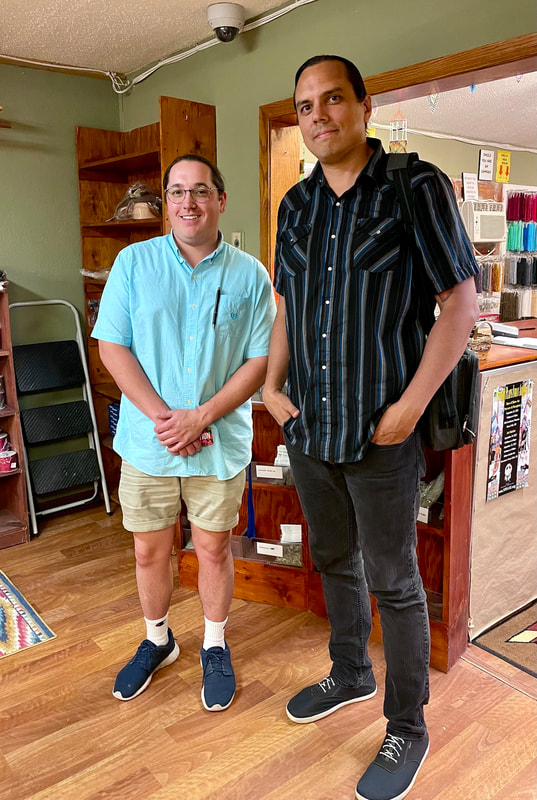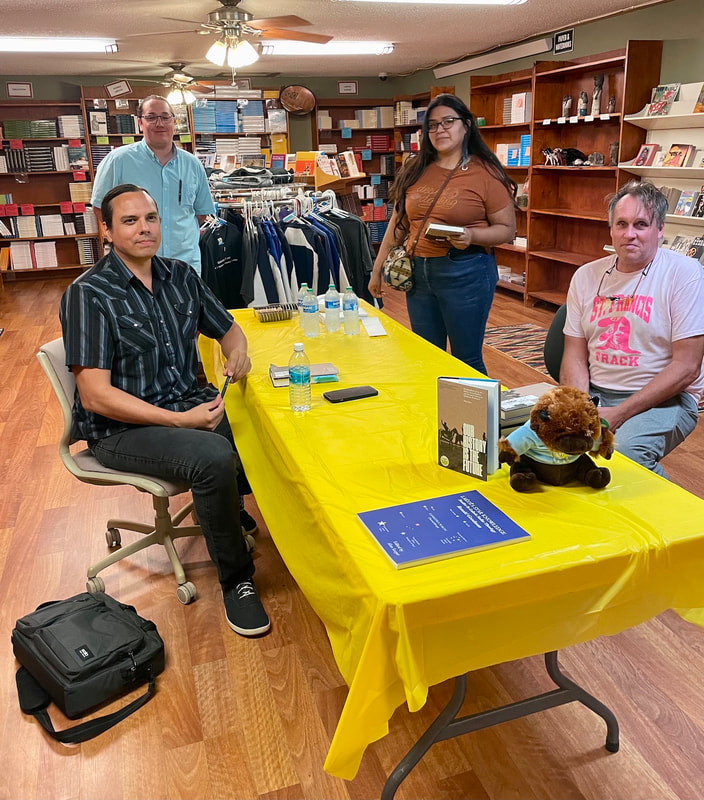|
One Book South Dakota Author Visited SGU Bookstore
Nick Estes, Kul Wicasa [kuhl wee-CHAH-shah] and a citizen of the Lower Brule Sioux Tribe, recently joined the Department of American Indian Studies at the University of Minnesota. Before that, he served as an Assistant Professor in the American Studies Department at the University of New Mexico, and he was the American Democracy Fellow at the Charles Warren Center for Studies in American History at Harvard University. Estes is not only a historian and author, but also a co-founder of The Red Nation, an Indigenous resistance organization. His research engages colonialism and global Indigenous histories, with a focus on decolonization, U.S. imperialism, environmental justice, anti-capitalism, and the Oceti Sakowin [oh-CHEH-tee shah-KOH-wee]. In the 2022 One Book South Dakota selection, “Our History Is the Future,” author Nick Estes places the Indigenous-led movement to stop the Dakota Access Pipeline into historical context. This summer, he is traveling the state to talk directly with readers. Sinte Gleska University hosted Estes on his One Book South Dakota Author Tour for “Our History Is the Future” on August 4, 2022 at the SGU Bookstore. He discussed his work, answered questions and signed books. “Our History Is the Future: Standing Rock Versus the Dakota Access Pipeline, and the Long Tradition of Indigenous Resistance” discussions and author visits fulfill the South Dakota Humanities Council’s mission to “celebrate literature, promote civil conversation, and tell the stories that define our state.” Author Nick Estes will visit several South Dakota communities this summer and will speak at the 2022 South Dakota Festival of Books, Sept. 23-25 in Brookings. “Our History Is the Future” addresses timely issues of regional relevance and puts them in the context of centuries of Indigenous resistance to injustice, with a particular focus on the experiences of the Oceti Sakowin – the Lakota, Dakota, and Nakota people. A native of Chamberlain and a citizen of the Lower Brule Sioux Tribe, Estes spent more than a decade researching the book, which fills a gap he saw in historical literature. “This book was written for my 16-year-old self,” he said. “I didn’t have any knowledge of Native writers or Native books, and I especially didn’t have a firm grasp of the history of this land. Standing Rock provided a way to talk about not only current activism but also a long history of settler colonialism in the Missouri River basin and along the river that we call Mni Sose.” Estes hopes his book will provide inspiration for readers who learn about the humble origins and future-oriented goals of #NoDAPL and the movements that came before it. “Many of our movements throughout history were started by humble people, and those humble people were the ones who changed history and changed the future of this planet,” he said. “That’s incredible. And that’s something that I think everyone, whether you’re Indigenous or not, should feel inspired by.” Estes recently joined the Department of American Indian Studies at the University of Minnesota. Before that, he served as an Assistant Professor in the American Studies Department at the University of New Mexico. For 2017-2018, Estes was the American Democracy Fellow at the Charles Warren Center for Studies in American History at Harvard University. In 2014, he co-founded The Red Nation, an Indigenous resistance organization. His research engages colonialism and global Indigenous histories, with a focus on decolonization, U.S. imperialism, environmental justice, anti-capitalism, and the Oceti Sakowin. With Jaskiran Dhillon, Estes edited the volume “Standing with Standing Rock: Voices from the #NoDAPL Movement,” which draws together more than thirty contributors, including leaders, scholars, and activists. He was a guest editor with Melanie K. Yazzie of a special issue of Wicazo Sa Review on the legacy of Dakota scholar Elizabeth Cook-Lynn, one of the founders of American Indian Studies. In 2015, Estes’ reporting on border town violence and racism for Indian Country Today won a Third Place Prize for Excellence in Beat Reporting from the Native American Journalism Association. His writing has also appeared in The Intercept, Jacobin, The Funambulist Magazine and High-Country News. His film and book reviews can be found in Environmental History, Native American and Indigenous Studies Journal, Harvard Business Review and Abolition Journal.
0 Comments
|
Strengthening the Circle :
|
- About
- Quick Links
- News
- Governance
- Discover SGU
-
Student Life
- Facts and Figures
- Online Learning Support
- New Student Info/Registration
- Research Review Board >
- 2023 Graduation Ceremony
- 2023 Graduate Photos
- Student Association
- Literacy Center
- Disability Services
- Counseling Services
- Child Care
- Transportation
- Security
- Bookstore
- Library
- Web Mail
- What You Can Do At SGU
- Poll
- Student Opportunities
- After Graduation
-
Departments
- Staff
- Giving
- Board Minutes
Mailing Address: Po Box 105/Mission, SD/57555
Shipping Address: 101 Antelope Lake Circle/Mission,SD/57555
605-856-8100
Shipping Address: 101 Antelope Lake Circle/Mission,SD/57555
605-856-8100
Accreditation and Sinte Gleska University – A Short History
Sinte Gleska University has been accredited by the Higher Learning Commission (HLC – formerly the North Central Association) since 1983. Because SGU is accredited, colleges and universities across the United States will review courses that students take at SGU and will consider them for transfer.
For more information, and to see the most recent correspondence from HLC to SGU, click on the HLC logo
Sinte Gleska University has been accredited by the Higher Learning Commission (HLC – formerly the North Central Association) since 1983. Because SGU is accredited, colleges and universities across the United States will review courses that students take at SGU and will consider them for transfer.
For more information, and to see the most recent correspondence from HLC to SGU, click on the HLC logo
All Media on this site ©2023 Sinte Gleska University.
Do not use without permission. Sinte Gleska University and the Sinte Gleska University Logo are Protected and Registered Trademarks.
Not to be used without permission.See HERE for legal information
Do not use without permission. Sinte Gleska University and the Sinte Gleska University Logo are Protected and Registered Trademarks.
Not to be used without permission.See HERE for legal information



 RSS Feed
RSS Feed
